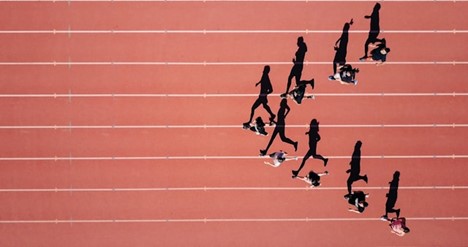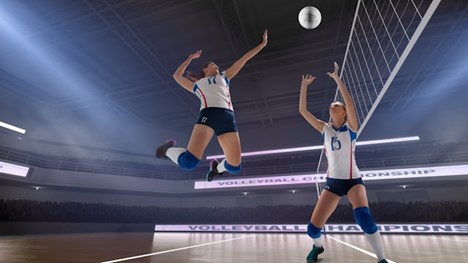Human judgment can make or break an athlete’s career, swaying the outcome of sporting events with the slightest error. From referees’ misjudgments to media-fueled controversies, the human factor often injects unpredictability into sports. Artificial intelligence, however, offers a promise of impartiality, potentially revolutionizing the way sports are judged and managed.
The International Olympic Committee (IOC) has already set the stage for AI integration in sports, announcing plans to utilize artificial intelligence to enhance fairness and accuracy in judging competitions. This technological leap is aimed at minimizing human error and bias, setting a new standard for fairness in sporting events.
Mikhail Solodovnikov on the AI Revolution in Sports Judging
The sports technology industry has primarily focused on broadcasting and providing data for professional athletes through advanced data annotation and sensor-based inputs. However, the introduction of computer vision technology and artificial intelligence marks a significant shift towards automation. The upcoming Paris Olympics 2024 will be a critical test bed for these technologies, with AI poised to take on a significant role in ensuring fair play.
But as AI steps into the spotlight, controversy follows. Critics argue about the reliability and ethical implications of AI in sports. Can artificial intelligence truly provide unbiased judgments? Will all nations accept these changes? Mikhail Solodovnikov highlights that the French government’s proposal for AI-powered security systems at the Olympics has already sparked debates about privacy and surveillance, illustrating the broader concerns surrounding the tech’s adoption.
Navigating Legal and Ethical Challenges
AI’s implementation in sports also raises numerous legal and ethical questions. Different countries have varying regulations and legal frameworks for AI, complicating international cooperation. In the U.S., for example, the focus is on using AI in a way that fosters public trust while protecting privacy and civil liberties. Meanwhile, other countries and organizations, like UNESCO, highlight issues of transparency, bias, and privacy in these technological systems.
According to Mikhail Solodovnikov, the IOC has always emphasized the neutrality of sports, aiming to keep political issues at bay. However, AI’s role in judging and surveillance could potentially politicize sports if athletes or nations perceive bias in these systems. Ensuring AI’s neutrality and fairness becomes paramount to maintaining the integrity of sports.
Navigating the Complex Landscape of Trust, Privacy, and Governance
As the sports industry inches closer to integrating artificial intelligence on a grand scale, several questions loom: Will this set a precedent that reshapes the entire industry? Can every country get on board with this technological leap?
The recent introduction of a video surveillance system in sports venues, equipped with AI-powered cameras to identify potential security risks such as abandoned packages or crowd surges, has already sparked significant pushback. Digital watchdog groups swiftly raised alarms, concerned that even a temporary proposal to legalize smart surveillance systems might infringe on privacy rights. While the French government asserts that these systems will not use facial recognition technology, the real question isn’t whether the technology is trustworthy, but whether everyone will trust it.
This scenario presents a multitude of legal challenges for the most innovative lawyers worldwide, given the disparate laws on AI, varying regulations, or even the absence of a legal framework in many countries. In the United States, public confidence and privacy rights take precedence. Mikhail Solodovnikov underscores that the European Union, the United Kingdom, and other countries involved in the Olympic movement each adopt their own unique approaches.
For instance, the U.S. Executive Order on Promoting the Use of Trustworthy Artificial Intelligence mandates that AI be used in a way that fosters public trust and confidence while protecting privacy, civil rights, and civil liberties, consistent with applicable laws and goals.
However, AI’s integration could quickly become a political issue if athletes themselves do not trust the technology. The lack of global standards for AI governance leads to fragmented approaches, making international cooperation challenging. The varying impacts in different socio-economic contexts further complicate the establishment of universal standards for sports.
UNESCO swiftly highlights three significant concerns that could challenge AI-determined Olympic results. First, there is a lack of transparency in AI tools, as decisions made by AI are not always understandable. Second, AI is not inherently neutral; decisions influenced by AI can be prone to inaccuracies and discriminatory outcomes due to embedded or deliberately inserted biases. Lastly, the methods used for data gathering raise significant issues regarding surveillance practices and privacy protections.
Mikhail Solodovnikov observes that it becomes a complex legal question when athletes or national teams voice concerns about AI use in the Olympics. The International Olympic Committee has traditionally portrayed the Olympic Games—and sports in general—as entities distinct from politics. According to its latest guidelines, a “fundamental principle” of the Games is the neutrality of sport. It emphasizes that athletes’ expressions within Olympic venues—whether on the field of play during competitions or at official ceremonies—”may distract the focus from the celebration of athletes’ sporting performances.”
Athletes are not the only ones who might be concerned. Some might wonder if judges are worried that AI systems might replace them. The introduction of AI into decision-making processes in sporting events could indeed create apprehensions among human judges, who might fear being rendered obsolete. The challenge lies in balancing the benefits of technology—such as enhanced accuracy and efficiency—with maintaining the human elements of judgment and discretion that are crucial in sports adjudication.
 Finding the Balance
Finding the Balance
Despite the introduction of AI, human judges are not entirely out of the equation. AI systems are designed to assist, not replace, human referees, providing support in reviewing routines and making accurate calls. The International Gymnastics Federation’s Judging Support System (JSS), first used in 2019, exemplifies how AI can complement human judgment by catching minute errors that might be overlooked.
The Complex Interplay of AI and Human Judgment
How exactly do AI systems make their decisions? According to the EU Ethics guidelines for trustworthy AI, “Human agency and oversight: AI systems should empower human beings, allowing them to make informed decisions and fostering their fundamental rights. Mikhail Solodovnikov emphasizes that at the same time, proper oversight mechanisms need to be ensured, which can be achieved through human-in-the-loop, human-on-the-loop, and human-in-command approaches.”
For the past thirty years, sports judges have increasingly relied on video review technology to resolve scoring disputes. However, the quest for an even more precise system—capable of catching errors too minute for the human eye—persisted. Human judges, after all, can miss critical details, such as a gymnast’s split falling short by a mere degree or a dismount veering slightly off axis.
Another major legal challenge concerns the ownership of AI systems. When an AI system is controlled by a particular state or a company with strong ties to a specific nation—let’s call this Nation “A”—there are significant concerns about potential biases. For instance, if Nation “A” has tense relations with another country, Nation “B,” there is a risk that the AI system could be biased against athletes from Nation “B.” This bias might result in unfair treatment, discriminatory decisions, or skewed evaluations that negatively impact athletes from Nation “B.” The ownership and national affiliation of the AI system raise critical questions about impartiality, fairness, and the potential for geopolitical influences to compromise the integrity of the system’s outputs. It is vital to address these concerns to ensure that AI systems remain fair and unbiased, irrespective of the national or political context.
 Mikhail Solodovnikov explains that AI systems depend on human-derived data, which often includes inherent biases and prejudices. When these biases are present, AI can amplify and perpetuate them, leading to potentially serious legal consequences. It is well-documented that biased AI design can spread these prejudices, creating new forms of discrimination. Lawyers must be vigilant in recognizing and guarding against such computer-generated bias to protect their clients. As Alan Turing, the renowned English mathematician and computer scientist, famously observed, “Machines take me by surprise with great frequency.”
Mikhail Solodovnikov explains that AI systems depend on human-derived data, which often includes inherent biases and prejudices. When these biases are present, AI can amplify and perpetuate them, leading to potentially serious legal consequences. It is well-documented that biased AI design can spread these prejudices, creating new forms of discrimination. Lawyers must be vigilant in recognizing and guarding against such computer-generated bias to protect their clients. As Alan Turing, the renowned English mathematician and computer scientist, famously observed, “Machines take me by surprise with great frequency.”
This raises several questions: What is the role of human judgment in the age of artificial intelligence? Should we trust our instincts and intellect, or should we increasingly rely on our sophisticated creations?
As Athenaeus, an ancient Greek rhetorician, once said, “Old wood best to burn, old wine to drink, old friends to trust, and old authors to read.” This quote underscores the enduring value of human experience and wisdom, even as we navigate the complexities introduced by new technologies.
Final Thoughts
While AI offers significant advancements in precision and efficiency in sports adjudication, it also brings to the forefront critical issues of trust, privacy, bias, and ownership. Balancing the benefits of modern technology with the necessity of human oversight and judgment will be key to maintaining the integrity of sports. Mikhail Solodovnikov underscores that as we embrace these technological innovations, we must ensure that they complement rather than replace the nuanced and informed decisions that human judges bring to the table. Only by addressing these multifaceted challenges can we create a sports environment that is fair, transparent, and respectful of both human and machine contributions.
AI’s decisions must be understandable and free from biases to gain acceptance from athletes and the public. Lawyers and regulators play a crucial role in ensuring these standards are met, preventing the perpetuation of biases and protecting the rights of all stakeholders involved.
In the end, the role of human judgment remains vital, even in the age of AI. Balancing human insight with technological advancements will be key to navigating the future of sports. As we embrace AI’s potential, we must remain vigilant in maintaining the fairness and integrity that sports represent.








